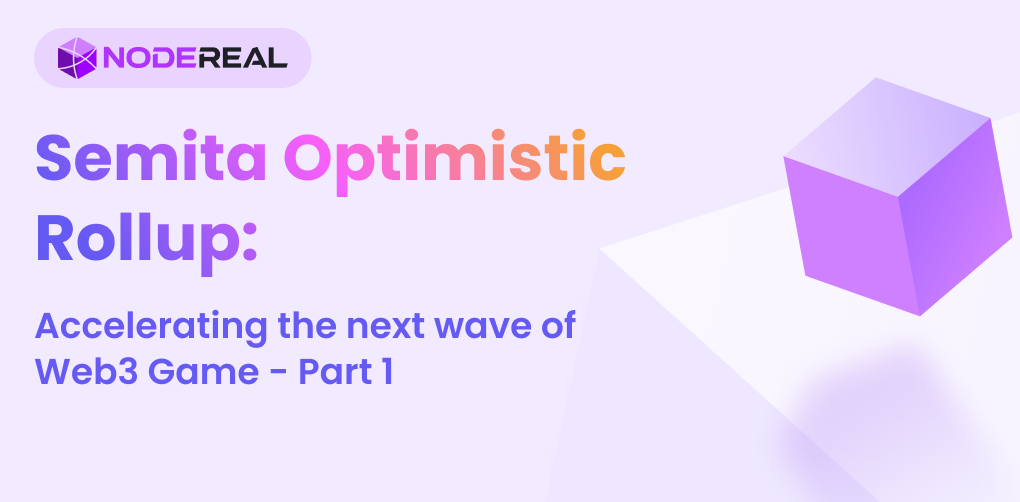TL;DR
- Similar to current games, Web3 games require innovations in blockchain technology to be a solid foundation to have smooth, easy, and responsive gaming experiences. NodeReal brings innovations through Semita Rollup Solution for Web3 games.
- Thanks to a modular design, NodeReal Semita Optimistic Rollup provides flexibility that can meet game developers' requirements and abstract away the complexity of blockchain technology for game builders and game players.
- As the first OPStack gaming rollup chain, NodeReal works closely with COCOS-BCX to enhance the gaming ecosystem on the BNB Chain and contribute innovations to the gaming ecosystem.
Building a Web3 game is difficult
The world of Web3 gaming is bursting with potential, yet, it's currently held back by a couple of critical challenges that developers must first address. The allure of play-to-earn mechanics alone isn't enough to captivate gamers; they crave fun, engaging experiences that are easy to dive into. The reality is that many players aren't tech-savvy, and if they have to decipher blockchain technology before even starting the game, they'll quickly abandon the ship.
But that's not all; Web3 games are often plagued by slow speeds, testing the patience of players as they wait for digital assets to be looted or transferred between friends. These two formidable obstacles - accessibility and performance - stand between Web3 game developers and the thrilling future of decentralized gaming that players are eagerly awaiting.
As a developer venturing into the realm of Web3 games, you may find yourself inundated with new concepts, tools, and technologies. The learning curve can be steep, as understanding blockchain technology is a prerequisite for building Web3 games. The process often involves searching the web for resources, installing various tools, setting up your blockchain RPC, and indexing data. However, these complexities detract from your primary focus, which is developing the game itself. What you need is a unified, user-friendly toolset that streamlines the development process and enables you to focus on building your Web3 game efficiently and effectively.
COCOS BCX & Semita Rollup: A Great Development Experience to Build the next successful Web3 Game.
Cocos Engine is making waves in the world of 2D/3D gaming and digital content creation, boasting an impressive 1.6 million registered developers across 203 countries and regions. With a staggering 1.6 billion global players enjoying games built with Cocos Engine, it's clear that this platform is a true game-changer.
Now, Cocos BCX has set its sights on conquering the Web3 domain, aiming to craft an intuitive game engine that lets developers build cutting-edge Web3 games without grappling with the intricacies of blockchain technology. Web3 gaming is about so much more than just play-to-earn; it promises a superior gaming experience with enhanced privacy protection, seamless in-game asset management and exchange, token-based economies, and unparalleled community engagement.
COCOS BCX and Semita Rollup, when combined, can create a robust and feature-rich gaming development experience for building successful Web3 games. Let's take a look at each of these components and how they can be integrated for an optimal gaming development experience.
The key challenges in Web3 Game Development
Web3 games have the potential to captivate tech-savvy gamers eager to explore the latest innovations. NodeReal Semita Optimistic Rollup is a layer 2 scaling solution built with OPStack with optimization and innovation for gaming starting from the BNB Smart Chain(BSC).
A series of challenges hinder web3 game development that Semita Optimistic Rollup Solution aims to solve:
- Limited TPS: Current blockchain technology, particularly public chains like Ethereum, struggle to provide a highly responsive gaming experience due to limited transactions per second (TPS).
- Slow data access: RPC endpoints and APIs are sluggish, making it difficult to scale when traffic spikes hit.
- Exorbitant transaction fees: Layer 1 fees are unsustainable for gamers who want to exchange in-game assets or tokens.
- Complex user account management: Wallet recovery phrases and transaction signatures are barriers for non-tech-savvy gamers looking to dive into Web3 games.
- Gas fees with native tokens: The need for native tokens as gas fees further complicate the user experience.
- No session concept: Users must sign every transaction on the current public layer 1 blockchain, making actions like looting equipment painfully slow and frustrating.
- Development complexities: Game developers unfamiliar with blockchain technology face a steep learning curve that includes mastering RPC APIs and data indexing.
- Limited access to the Web3 community: Simplifying the onboarding process and leveraging the existing Web3 user base is vital for Web3 games to succeed.
We're thrilled to join forces with COCOS-BCX to create the pioneering OPStack-based game rollup chain! Seamlessly integrating with the COCOS Creator as part of the COCOS engine, this cutting-edge Rollup will enable developers to effortlessly build Web3 games right out of the box. Get ready for a new era of gaming experiences, powered by our groundbreaking collaboration!
Modular Design Principle
NodeReal Semita OPRollups are built on the solid foundation of modular OPStack. It serves as the cornerstone of NodeReal's Semita Optimistic-as-a-Service solution, which is based on the super powerful OP Stack Designed with modularity at its core; this approach enables distinct components within the blockchain system to be developed and refined independently. This fosters a more agile and efficient development process, ensuring seamless integration and adaptability across various blockchain components.
Modular Design allows rollup solutions to adapt and grow with the most recent technological advancements. For instance, if a superior execution engine emerges, it can replace the existing execution layer without affecting other components of the rollup. Another example is the ability to swap fault-proof methods with a zk-based technology, transforming an OPRollup into a ZKRollup seamlessly.
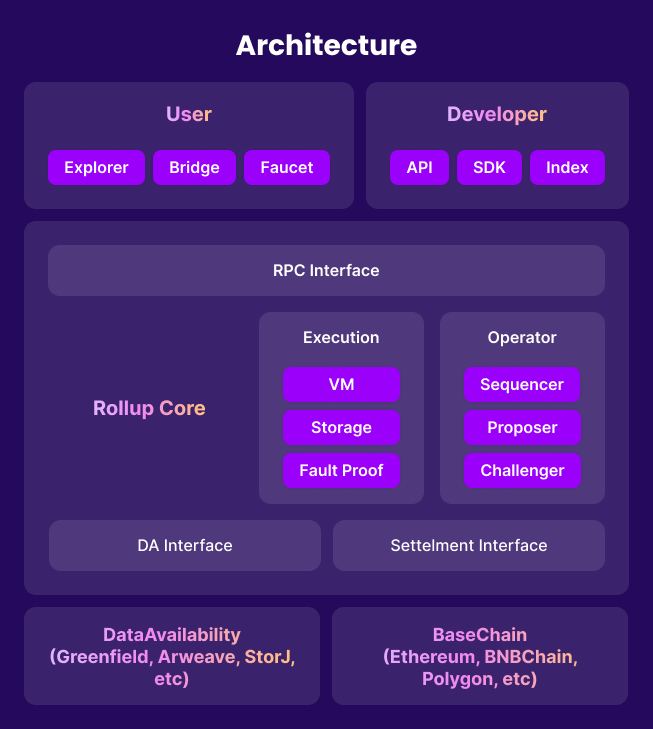
Leveraging OP Stack modular design, our solution optimizes the Web3 gaming infra stacks through several key enhancements.
- Delivering significantly higher TPS (targeted at 10k) compared to Layer 1 solutions, ensuring a responsive gaming experience.
- Its modular design greatly reduces gas fees, while offering scalable, fast, and reliable API and RPC endpoints.
- Account Abstraction support simplifies user login, account recovery, and ERC20 token gas fee management.
- Integration with the Cocos Engine IDE provides a comprehensive toolkit for game developers, including NFT and social login features.
- We minimize gas fees by defining a Data Availability (DA) interface and storing Layer 2 transaction data on a separate DA layer, such as Greenfield, Arweave, or other chains. This approach significantly reduces gas expenses.
- Enhance reliability by implementing High-Availability (HA) solutions through multiple instances of components, including sequencers and batches. This provides the gaming platform with a more robust blockchain foundation.
- Building on the BSC Layer 1 chain enables game developers to leverage the vast BSC user community, boosting the Web3 gaming ecosystem.
Semita Optimistic Optimization On BSC
Ethereum and BSC have key differences in their technical specifications and features as below:
Block Time: Ethereum has an average block time of 12-15 seconds, while BSC boasts a faster block time of around 3 seconds, which could provide higher TPS for BSC users.
Block size: BNB Smart Chain (BSC) has a larger block size limit compared to Ethereum. The block size limit on BNB SmartChain is 16 MB, while the block size limit on Ethereum is around 30 KB. This means that BNB Smart Chain can include more transactions in a single block compared to Ethereum.
Transaction Type: BSC does not support EIP1559 transactions
As we know, Optimistic Rollups currently only work with Ethereum as the layer 1 chain, which means that customizations and technical optimizations are required to make the Semita Optimistic Rollups function seamlessly with BSC to achieve our goal of higher performance, lower gas fee, and more reliable rollup.
Lowest Gas Fees
Rollup gas fees generally comprise two elements: 1. L2 block gas fee, and 2. L1 submission gas fee (DA layer fee, as Rollups, necessitate submitting all L2 transactions to L1). For gaming, having low gas fees is crucial compared to other use cases. By migrating OPStack to the BSC Ecosystem, we have significantly reduced gas prices (approximately one-tenth of ETH). Additionally, we have implemented numerous optimization techniques, which have successfully lowered the average gas fee to less than $0.0005 (native transfer).
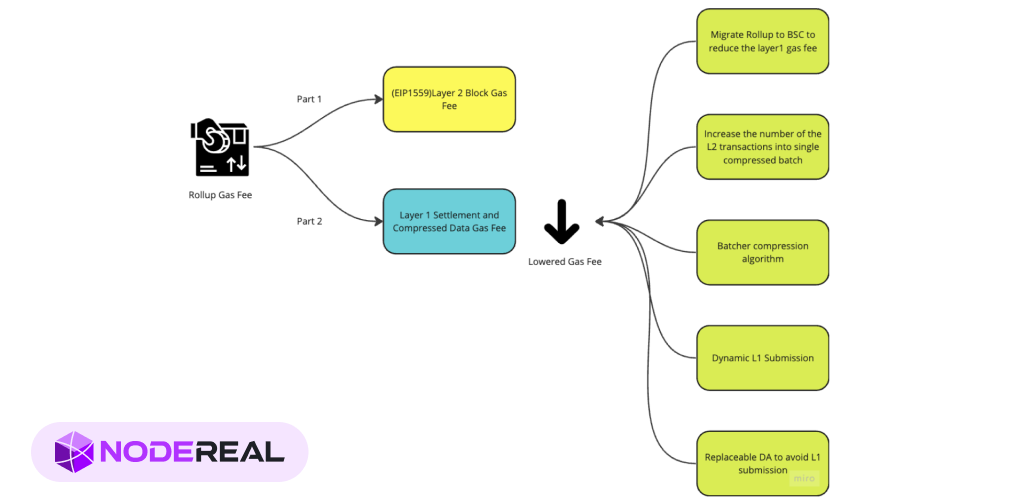

Increased Stability of OP Rollup
We changed the logic of Optimistic Batcher to submit the compressed transactions to BSC to increase the OPRollup more stable. Below is how we did.
We modified Optimistic Batcher's logic to submit compressed transactions to BSC, enhancing OPRollup stability. The key steps we took include:
- Addressing BSC-ETH differences: BSC transactions don't support EIP1559 and have a faster block time (3s) than ETH. When Layer 1 faced issues or became overloaded, compressed batch transactions could fail.
- Fixing submission retries: The Optimistic Rollup batcher's retry mechanism converted transactions to the EIP1559 type, causing further failures due to incompatibility.
- Resolving data frame issues: When compressed transactions were reverted to the queue, the data framework version wasn't removed from the payload, leading to data frame parsing failures.
By adjusting the logic, we improved the batcher's compatibility with BSC and increased Rollup stability on both BSC and ETH. This change has been contributed back to the OPStack community.
Future work in 2023
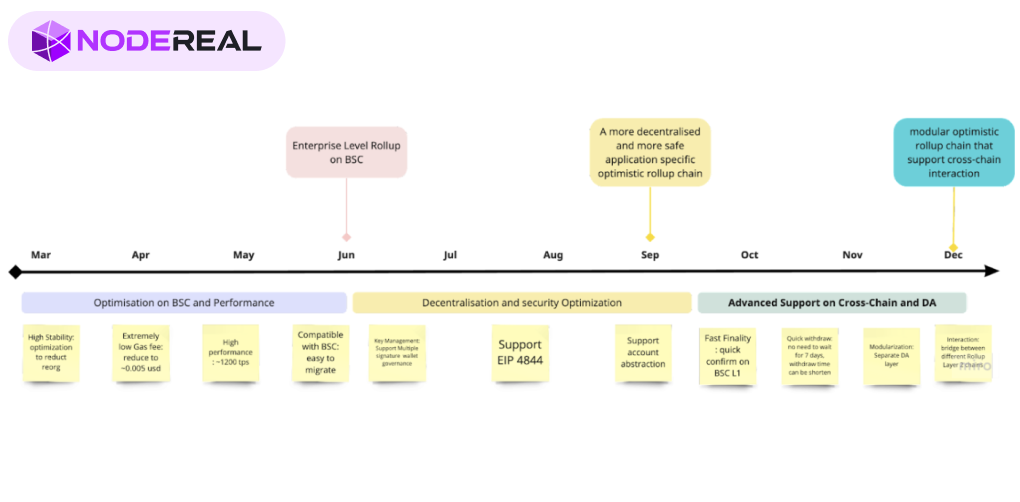
In 2023, we have outlined three major milestones to enhance our platform's capabilities and performance.
The first milestone involves transforming the rollup into an enterprise-level solution on BSC, focusing on improving reliability and performance. Our goal is to achieve a gas limit of less than ~0.0005 USD and support 1200+ TPS.
For our second milestone, we will concentrate on decentralizing the rollup, ensuring it meets our stringent security requirements. Key features to be introduced include multi-signature wallet governance and account abstraction.
Lastly, by the end of 2023, we aim to incorporate advanced cross-chain support and enable replaceable Data Availability (DA) by Greenfield. This will further reduce Layer 1 costs and enhance the overall efficiency of the platform.
Please note that these milestones serve as a high-level overview of our development goals for 2023, and the actual progress may vary based on user feedback, industry trends, and technological advancements. In the sections that follow, we will outline some of the groundbreaking innovations that we are currently working on and developing.
Push the gas fee to almost zero
Dynamic Submission Strategy to reduce gas fee even further
We are working on the optimization of batcher to implement the dynamic submission strategy. The batcher keeps watching the gas price of layer 1 and if the layer1 gas prices is higher than a threshold, and the submission can be done within the time window frame, the batch will pause the submission to reduce the cost even further.
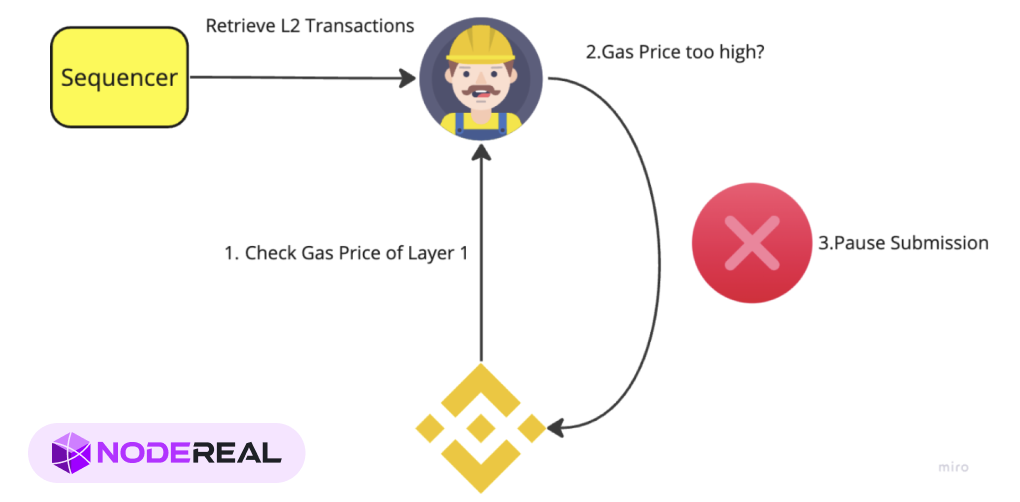
Optimization by replaceable DA layer
As previously discussed, we are planning to incorporate Greenfield as the data availability (DA) layer for Semita Optimistic Rollup.
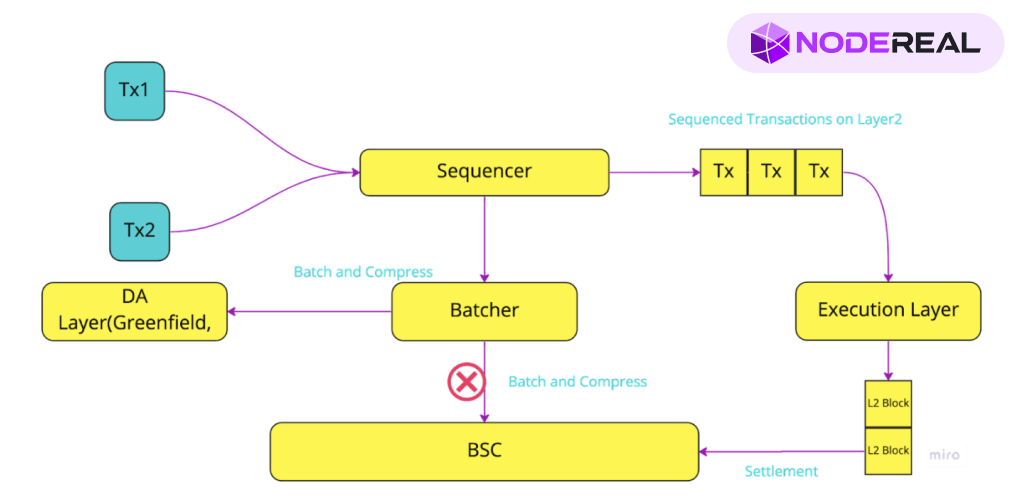
After implementing the integration with Greenfield, the batcher will only submit the compressed transactions to Greenfield, so the gas fee of layer 1 will be reduced. The benefits of a dedicated DA layer extend beyond lower gas fees. By reducing the load on Layer 1 and enhancing the performance of Layer 2, the system can achieve higher transaction throughput and lower latency. This translates to a better user experience and improved scalability of the overall platform. With Greenfield as the DA layer, Semita Optimistic Rollup is well-positioned to deliver enhanced efficiency, security, and scalability to the blockchain ecosystem.
Bedrock Protocol Optimization to increase layer 2 Reliability
It is widely understood that Layer 2 transactions must be submitted to the Layer 1 chain as a data availability layer within a specified time window. Failure to meet this time window renders the transactions invalid, potentially resulting in a Layer 2 chain reorganization. To minimize the likelihood of reorganization, which often occurs when the Layer 1 chain experiences heavy loads, we have implemented optimizations aimed at enhancing the stability and efficiency of Layer 2 chains.
By fine-tuning the underlying mechanisms and adjusting the communication between Layer 1 and Layer 2, our optimizations effectively reduce the chances of reorganization, ensuring a more stable and reliable Layer 2 chain even during periods of high demand on the Layer 1 chain.
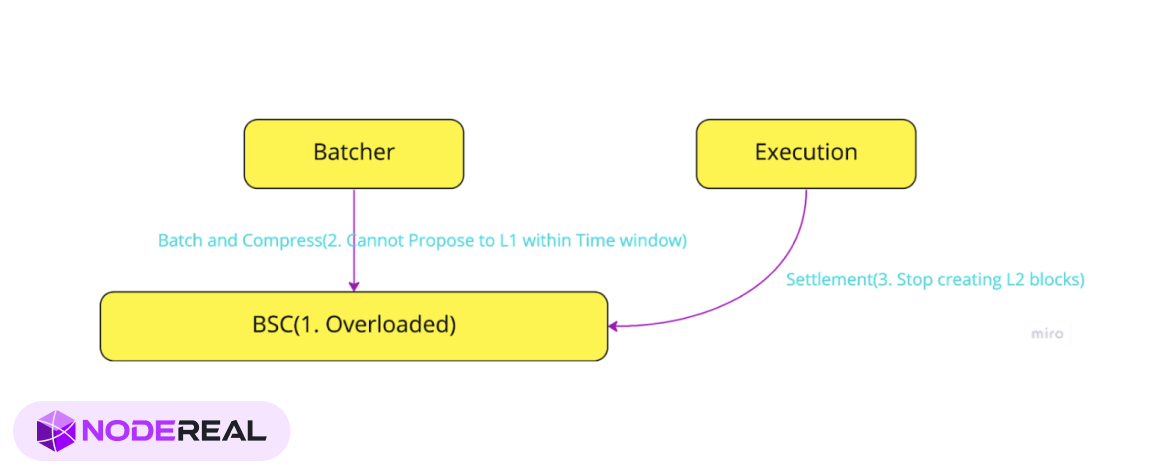
Contribute back to the Optimistic Rollups community
Openness and collaboration is our core value in NodeReal. We will contribute back to the OP Rollup community by open-sourcing our NodeReal/Cocos Engine, a game engine that supports the OP Stack. We will also invite other builders to join us in building on the OP Stack and help grow the ecosystem. Starting from the BNBChain roll-up and eventually expanding to EVM-compatible ecosystems including Ethereum, Polygon, and others. Cocos-BCX & NodeReal will contribute back to the OP Rollup community and are also looking forward to welcoming more builders on this first game rollup.
Here are some of our recent contributions to the community. Stay tuned for the latest updates and information:
- Improve Transaction Compatibility & Data Frame Handling
- Remove the AddSafeAttributes Function
- Remove LastL2Time Function
- Cancel Failed Payload Confirmation
Summary
We believe that the game-optimized blockchain is the future of Web3 gaming. By building the first game rollup chain on the OP Stack, we aim to provide game developers with easy-to-use tools, high performance, low gas fees, and scalable rollup solutions. Our tech roadmap outlines our approach to solving these challenging problems and expanding to other blockchain ecosystems. We are excited to contribute back to the OP Rollup community and invite other builders to join us on this journey. Stay tuned for more updates as we continue to develop the first game rollup chain on the OP Stack together with COCOS.
As we mentioned, stay tuned for our Part 2.
About NodeReal
NodeReal is a one-stop blockchain infrastructure and service provider that embraces the high-speed blockchain era and empowers developers by “Make your Web3 Real”. We provide scalable, reliable, and efficient blockchain solutions for everyone, aiming to support the adoption, growth, and long-term success of the Web3 ecosystem.
Join Our Community
Join our community to learn more about NodeReal and stay up to date!

